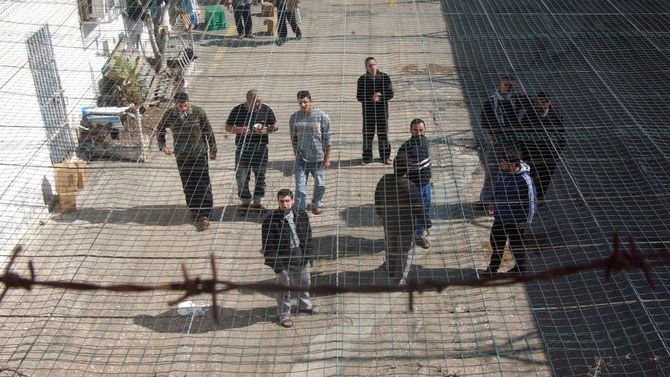RAMALLAH: Palestinian human rights and prisoners’ rights organizations have accused Israel of escalating its controversial administrative detention policy to undermine any non-violent resistance to the occupation.
Palestinian prisoners’ rights organizations say that 400 arrests have taken place under administrative detention criteria since the beginning of this year.
Orders under this policy target anti-Israel activists. It was widely used during the May 2021 escalation between the Palestinians and Israelis.
Under this controversial system, Palestinian prisoners are held without trial and without having committed an offense, only on an Israeli assessment that they might break the law in future.
This measure is supposed to be preventive and has no time limit. There are no legal proceedings. It can come into force following the orders of a regional military commander, based on classified evidence that is not revealed to victims.
This leaves the detainees helpless, facing unknown allegations with no way to disprove them, and not knowing when they will be released.
Qadoura Faris, head of the Palestinian Prisoners’ Club, told Arab News: “The Israeli authorities have started resorting to implementing desperate measures in response to the recent confrontations between the Palestinians and the Israeli security forces, by escalating and expanding the circle of administrative detention, which has affected dozens recently.”
Faris said this measure was likely to force many detainees to go on individual hunger strikes, as had happened after the escalations last May.
Several Palestinian victims of this draconian policy have staged hunger strikes over the past few years, some of which lasted for 141 days.
Faris said this behavior provided insight into the confusion and fear under which the Israeli “security” institutions operated.
“The administrative detention orders recently issued by the Israeli military authorities against the Palestinians will not achieve security for Israel. It is rather a show aimed at appearing helpless in the face of the escalation of the Palestinian resistance. The Israeli military has several ways to curb the resistance of the Palestinians,” Faris told Arab News in Ramallah.
The Israeli military authorities, he said, have renewed administrative detention orders for prisoners under the pretext that the security situation in the West Bank does not encourage their release. “So, what did these prisoners do against Israel’s security while in prison?” Faris added.
Israel is holding about 500 Palestinians as administrative detainees. Most of whom have spent years in detention, including two women, Shrouk Al-Badan from Bethlehem and Bushra Al-Taweel from Al-Bireh, in addition to the prisoner Khalil Awawda, who continues his strike for the 36th consecutive day as a means of protest.
Meanwhile, the detainees’ boycott of Israeli courts in protest against their detention has entered its 97th day.
Palestinian human rights organizations are struggling to have this policy abolished, which is considered to cause the most harm to detainees, apart from the lack of medical care.
Faris accused international organizations of ignoring the plight of these prisoners, with many “coexisting with this policy” which they do not see as “a violation and … intimidation and injustice against the Palestinians by Israel.”
The policy was implemented significantly during the first Intifada between 1987 and 1993, stopped in 1997 and 1998, and then resumed with the outbreak of the second Al-Aqsa Intifada in late 2000.
The Israeli military authorities have issued more than 8,700 administrative detention orders against Palestinians since 2015.
The highest number was 1,742 orders, recorded in 2016. From the end of 2011, until the end of 2021, the administrative detainees carried out more than 400 individual hunger strikes, and a joint strike in 2014 that lasted for 62 days.
The Palestinians commemorate Prisoners Day on April 17 every year because there is no family that has not had a member arrested by Israeli forces.
Since the beginning of the Israeli occupation in mid-1967, more than 1 million Palestinians have been arrested.
Some 4,400 are still in Israeli prisons, including women, 160 children, the sick, and the elderly. Some have spent more than 42 years in captivity. The longest-serving prisoner is Nael Barghouthi.
“Israel routinely uses administrative detention and has, over the years, placed thousands of Palestinians behind bars for periods ranging from several months to several years, without charging them, without telling them what they are accused of, and without disclosing the alleged evidence to them or their lawyers,” said a B’Tselem report.
A Jerusalem-based non-profit organization, B’Tselem strives to document human rights violations in the Israeli-occupied Palestinian territories, combat any denial of the existence of

